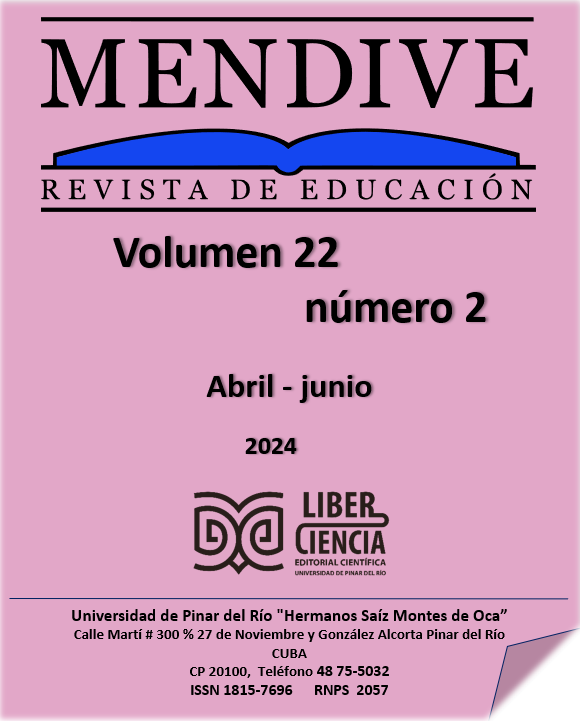Educational strategy for the development of self-determination in students with intellectual disabilities
Main Article Content
Abstract
The dizzying development of the scientific-technical revolution and its impact on the educational sphere require the continuous improvement of the directors of special education educational institutions, since it is their responsibility to scientifically direct the educational processes, advise teachers, families and coordinate with the socio-educational agents of the school network to achieve in students the development of practical-social skills and quality learning for life, so that they graduate fit and capable of interacting appropriately in their socio-family environment. Hence, the need to implement actions aimed at the professional improvement of the director. The article exposes a pedagogical improvement strategy to transform the modes of action of special education managers in the direction of scientific-methodological work aimed at the development of self-determination skills in students with intellectual disabilities. Theoretical and empirical methods were used to identify and solve the improvement needs of managers. The novelty of the strategy lies in the articulated conception of the different forms of improvement, established in Advanced Education, from the municipality's work system, with a systemic, planned and conscious character. With its implementation, the professional and personal performance of the managers and students was improved, who graduated with the empowerment of skills for making decisions, making choices, solving problems and establishing goals and objectives.
Downloads
Article Details

This work is licensed under a Creative Commons Attribution-NonCommercial 4.0 International License.
References
Añorga-Morales, J. A. (2014). La Educación Avanzada y el mejoramiento profesional y humano. Varona, 58, 19-31. http://www.redalyc.org/articulo.oa?id=360634165003
Bernaza, G.J., Aparicio, J.L., De la Paz, E., Torres, A.M. y Alfonso, J.E. (2020). La Educación de Posgrado ante el nuevo escenario generado por la COVID-19. Educación Médica Superior, 34(4), 18. http://www.ems.sld.cu/index.php/ems/article/view/2718
Cardoso Camejo, L., Valdés Naranjo, M. & Panesso Patiño. V. (2022). La teoría de la Educación Avanzada: epistemología de una teoría educativa cubana. Varona,15(49),39-52. http://revistas.ucpejv.edu.cu/index.php/rVar/article/view/1549
Fernández, F. A. (2021). La didáctica general y su enseñanza en la educación superior pedagógica. Aportes e impacto. Editorial Pueblo y Educación.
Cruz, L.C., Ramos, M., Nardiz, O. y Rivero, D. (2018). Fundamentos teóricos que sustentan el proceso de superación profesional de los tecnólogos en Podología. 22(6),1140-1148. http://revcmpinar.sld.cu/index.php/publicaciones/article/view/3468
De Armas Ramírez, N. & Valle Lima, A. (2011). Resultados científicos en la investigación educativa. Editorial Pueblo y Educación.
Leyva Fuentes, M. (2018). Manual de psicopedagogía. Material teórico instructivo para especialistas de los centros de diagnóstico y orientación. CDO. 21(4), 10. https://hdl.handle.net/123456789/2104
López Collazo, Z. S. (2019). Enfoques teóricos acerca de la superación profesional, una mirada en las áreas técnicas. Varona. Revista Científico Metodológica, 68 (1). e04. http://scielo.sld.cu/scielo.php?script=sci_arttext&pid=S1992-82382019000100004&lng=es&tlng=es
López Llerena, L. L., Rodríguez Torres, E., & Herrera Arencibia, L. (2023). Estrategia pedagógica para la preparación del profesor de Educación Física como mediador de conflictos. Podium. Revista de Ciencia y Tecnología en la Cultura Física, 18(3), e1474. https://podium.upr.edu.cu/index.php/podium/article/view/1474
Lozada Ortiz, A., Huepp Ramos, F. L., & Fumero Pérez, A. (2022). Apuntes históricos sobre la superación profesional del maestro logopeda en Santiago de Cuba. EduSol, 22(81), 20-35. http://scielo.sld.cu/scielo.php?script=sci_arttext&pid=S1729-80912022000400020&lng=en&tlng=es
Maiga, A. (2021). La Educación Especial en la república de Mali: antecedentes, desafíos y perspectivas. Recherches Africaines, (28 Juin), 60-67. https://www.google.es/url?sa=t&source=web&rct=j&opi=89978449&url=https://revues.ml/index.php/recherches/article/view/2329/1588&ved=2ahUKEwiFgcXUkJiFAxUsg4QIHQ0FAwcQFnoECBAQAQ&usg=AOvVaw2uHjXZy96L6bPZTDLBux_7
Organización de las Naciones Unidas para la Educación, la Ciencia y la Cultura. (2015). Transformar nuestro mundo: la Agenda 2030 para el Desarrollo Sostenible. http://www.unfpa.org/es/resources/transformar-nuestro-mundo-la-agenda-2030-para-el-desarrollo-sostenible-0
Resolución 140 de 2019. Ministerio de Educación Superior, Reglamento de Educación de Posgrado. Disponible en: http://www.gacetaoficial.goc.cu
Rivero, L. R. (2024). Alternativa de asesoría psicopedagógica para el trabajo con los docentes desde la inclusión educativa de adolescentes con Trastorno Espectro Autista. Joven Educador, 42(septiembre - diciembre), 1-11. http://revistas.ucpejv.edu.cu/index.php/rJEdu/article/view/1979
Triana Mederos, M. & Fernández Silva, I. (2019). La Educación Especial en Cuba: Concepción actual y perspectivas. Editorial Pueblo y Educación.
Urday-Cáceres, J. R. y Tenorio-Guevaras, T. (2022). Formación continua del docente universitario: reto y oportunidad para una enseñanza de calidad. Maestro y Sociedad, 19(3), pp. 1100-1129. http://maestroysociedad.uo.edu.cu
Valiente Sandó, P. (2003). Un modelo teórico-metodológico para la dirección de la superación postgraduada de docentes y directivos educacionales. La Habana: Editorial Pueblo y Educación.
Vega-Suárez, D., Jañez-Reyes, I., Rodríguez-Martínez, N. (2018). Sistema de acciones para la superación de los profesionales del CITMA en Guantánamo. Edusol, 18(1), 100-111. https://dialnet.unirioja.es/servlet/articulo?codigo=6843361
Wehmeyer, M. L. (2009). Autodeterminación y la Tercera Generación de prácticas de Inclusión. Revista de Educación, (349), 45-67 http://hdl.handle.net/11162/74528


